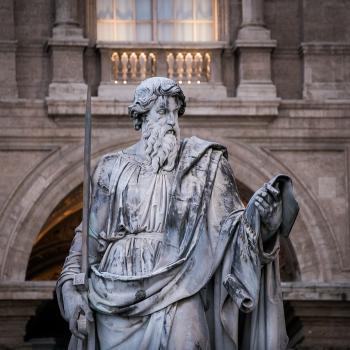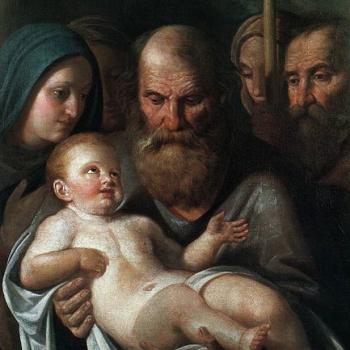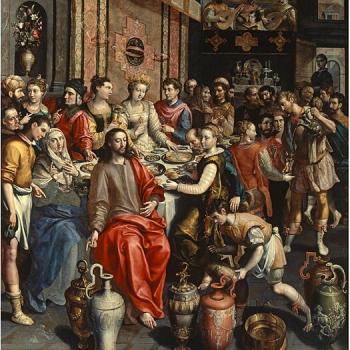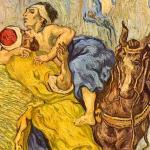
Anti-Catholic Reformed Protestant James Swan dug up a book, Catholic Scholars Dialogue With Luther (Chicago: Loyola University Press, 1970; edited by Jared Wicks, SJ), and highlighted Harry J. McSorley, C.S.P.’s chapter, “Erasmus versus Luther- Compounding the Reformation Tragedy.” His goal was to “prove” that Erasmus was a Pelagian or Semi-Pelagian (variations of the heresy of “works-salvation”), who supposedly denied the Catholic Church’s official teachings on grace. As usual with Swan and Anything Catholic, he was dead wrong.
He cited McSorley at length. I will counter his claims against Erasmus with the words of Erasmus himself, from his 1526 work, Hyperaspistes (Peter Macardle and Clarence H. Miller, translators, Charles Trinkhaus, editor, Collected Works of Erasmus, Vol. 76: Controversies: De Libero Arbitrio / Hyperaspistes I, Univ. of Toronto Press, 1999).
Fr. McSorley’s words will be in plain black and indented, while those of Erasmus will be in blue.
*****
First, Erasmus shows little appreciation of the genuine meaning of Luther’s thesis of the unfree will, namely, that the will of fallen man apart from grace is totally incapable of doing anything for salvation, totally unfree to do anything that is good in God’s sight. (p. 111)
And then, what need is there for simple Christians to dispute about contingencies and the will as merely passive, since the magisterium of the church regards as settled that the will does do something but that what it does is ineffectual unless grace constantly lends its aid? Christian people have held this doctrine for fifteen hundred years, nor is it right to dispute about it, except in a restrained way and so as to better establish what the church has handed down. (p. 139)
Instead of defining free will in terms of the ability to choose between certain alternatives, Erasmus defines free will in terms of salvation–without mentioning grace. Erasmus gives no hint in his definition that man the sinner is enslaved to sin until he is liberated by grace. . . . A third striking fact about De libero arbitrio is Erasmus’ unawareness that the Church, centuries before, had taken an official stand against a modified version of Pelagianism that came to be known, late in the sixteenth century, as Semipelagianism. . . . Such biblically oriented theologians as Bernard, Anselm, Thomas Aquinas, and Gregory of Rimini, who recognized Augustine as their theological master, especially in the doctrine of grace, were all agreed that the sinner is a slave to sin unless he is liberated by the prevenient grace of Christ. Thomas, without knowing of the decrees of Orange II, was even able to say that it is a “truth of faith” that the very beginning of faith is in us from God (p. 112)
Erasmus reveals his total unawareness of the Church’s rejection of Semipelagianism in the Hyperaspistes, his lengthy response to Luther’s reply to him in De servo arbitrio [The Bondage of the Will]. (p. 113)
How will a person rise up against God if he knows that he has in himself no hope of salvation without the singular grace of God, if he is persuaded that all human powers are of no avail for salvation without the aid of grace, especially since he is not unaware that everything he can do by his natural powers is the free gift of God? If a person wishes to cross the ocean, is he confident that he can achieve this without a ship and wind? And yet he is not idle while he is sailing. For professing free will does not tend to make a person attribute less to the mercy of God but rather keeps him from not responding to operating grace and gives him reason to blame himself if he perishes. I exalt God’s mercy so much, I diminish human power so much, that in the matter of salvation no one can claim anything for himself, since the very fact of his existence and whatever he can do by his natural endowments is the gift of God. (p. 186)
***
“Please Hit ‘Subscribe’”! If you have received benefit from this or any of my other 4,600+ articles, please follow this blog by signing up (with your email address) on the sidebar to the right (you may have to scroll down a bit), above where there is an icon bar, “Sign Me Up!”: to receive notice when I post a new blog article. This is the equivalent of subscribing to a YouTube channel. Please also consider following me on Twitter / X and purchasing one or more of my 55 books. All of this helps me get more exposure, and (however little!) more income for my full-time apologetics work. Thanks so much and happy reading!
***
We have not compared Erasmus’ opinion to the teachings of Orange II and Trent in order to indict Erasmus as a heretic. His unawareness that the Church had once taken a definitive stand in favor of the doctrine of fallen man’s bondage to sin exculpates him from the charge of formal error or heresy. That the decrees of the Second Council of Orange went astray and that a new form of the old Semipelagian error arose among late medieval theologians would seem to be more than anything else the result of negligence in the exercise of the Church’s teaching office (p. 114)
As for Erasmus, it is sufficient to point out that his views on grace and free will are not normative for Roman Catholics. The Catholic commitment to the grace of God is recorded above all in Scripture and in the Councils of Orange II, Trent, Vatican I and Vatican II. . . . the Council of Trent reaffirmed what was taught by the Second Council of Orange, . . . Martin Luther . . . proclaimed that fallen man could do nothing whatever without grace to prepare himself for salvation. This he did at a time in which many, many Catholics – -including Erasmus–had either lost this truth or were uncertain about it. (p. 117)
. . . in my Discussion I so distinctly and so clearly explain that there is no contradiction in saying that the sum and substance of a good deed should be attributed to God and asserting also that the human will does something, however tiny its share may be. (p. 154)
For why should anyone have faith in himself if he knows that he can neither begin nor complete anything without the help of God’s grace, to whom I profess that the sum and substance of all things rightly done ought to be attributed? Nor is there any difference between you and me except that I make our will cooperate with the grace of God and you make it completely passive. (p. 185)
When you say that a person taken captive by sin cannot by his own power turn his will to good unless he is blown upon by the breath of grace, we also profess this, especially if you mean turning effectively. (p. 188)
. . . you remove grace from free will, but when I say free will does something good, I join it with grace, and while it obeys grace it is acted upon and it acts felicitously. (p. 190)
Now see how you bear down upon me: it effects nothing without grace; therefore it does nothing at all with grace. Is this the trap you have set to catch me? (p. 190)
***
Erasmus asserted his orthodoxy and obedience to the binding teachings of the Catholic Church many times in the same book:
But let me show you how you have slandered me twice over: first I myself explicitly exclude from Scepticism whatever is set forth in Sacred Scripture or whatever has been handed down to us by the authority of the church. (p. 118)
I think it is sufficiently clear from my writings how much I attribute to Sacred Scripture and how unwaveringly I am in the articles of faith. On these points I am so far from desiring or having a Sceptical outlook that I would not hesitate to face death to uphold them. . . . now that the church has defined them [various “controverted teachings”] also, I have no use for human arguments but rather follow the decision of the church and cease to be a Sceptic. (pp. 118-119)
Whatever has been handed down as part of our faith is not to be sifted and searched so as to call it into question; rather it is to be professed. . . . Nor do I condemn in an unqualified way those who engage in moderate disputation, seeking to investigate some point which is not expressed in Sacred Scripture or defined by the church, . . . I do not condemn moderate investigation but rather obstinate strife to the detriment of religion and harmony. (p. 120)
I do not place more hope or find more consolation anywhere than in Holy Scripture, from which I believe I have derived so much light that I may hope for eternal salvation by the mercy of God . . . the decrees of the Catholic church, especially those issued by general councils and fully approved by a consensus of Christian people, carry such weight with me that, even if my tiny intellect cannot fully understand the human reasons underlying what is prescribed, I will embrace it as if it were an oracle issued by God, . . . call me a dyed-in-the-wool papist. . . . together with all good men I have desired the correction of the church, . . . (p. 127)
For what does it mean to submit human understanding to the judgment of the church if not to believe what the church prescribes? (p. 128)
I am at peace with the Catholic church, to whose judgment I have submitted my writings, to detect any human error in them, . . . (p. 141)
Am I in danger of offending the Spirit of God if I am afraid to dissent from the church of Christ? (p. 146)
***
Related Reading
“Luther Meets His Match” (Seven Parts, Feb. 2009):
*
Practical Matters: Perhaps some of my 4,600+ free online articles (the most comprehensive “one-stop” Catholic apologetics site) or fifty-five books have helped you (by God’s grace) to decide to become Catholic or to return to the Church, or better understand some doctrines and why we believe them.
Or you may believe my work is worthy to support for the purpose of apologetics and evangelism in general. If so, please seriously consider a much-needed financial contribution. I’m always in need of more funds: especially monthly support. “The laborer is worthy of his wages” (1 Tim 5:18, NKJV). 1 December 2021 was my 20th anniversary as a full-time Catholic apologist, and February 2022 marked the 25th anniversary of my blog.
PayPal donations are the easiest: just send to my email address: apologistdave@gmail.com. Here’s also a second page to get to PayPal. You’ll see the term “Catholic Used Book Service”, which is my old side-business. To learn about the different methods of contributing (including Zelle), see my page: About Catholic Apologist Dave Armstrong / Donation Information. Thanks a million from the bottom of my heart!
*
***
*
Photo Credit: Desiderius Erasmus (1466/1469-1536); portrait (1523) by Hans Holbein the Younger (1497/1498-1543) [public domain / Wikimedia Commons]
Summary: Catholic scholar Harry McSorley falsely accused Erasmus of Pelagian heresy and a denial of the Catholic doctrine of grace. I refute him from Erasmus’ own words.
















